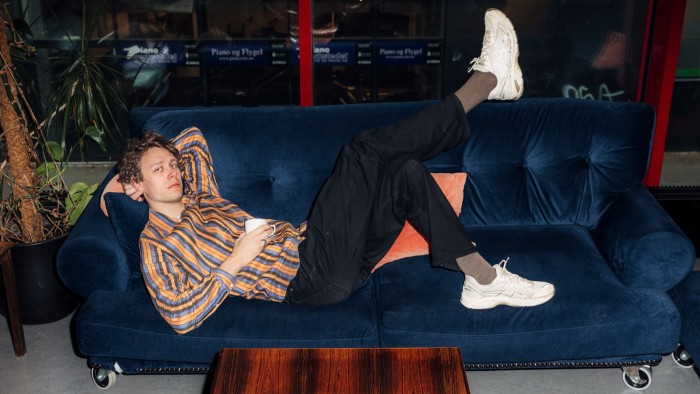Summarize this content to 2000 words in 6 paragraphs in Arabic Halfdan Ullmann Tøndel widens his eyes and runs his hand through his hair: he remembers when he won the Caméra d’Or – the award for best debut feature film – at Cannes last May, for his film Armand. The director had flown home to Oslo a few days earlier than planned.“I woke up on Saturday morning to the message that I’d won the award,” recalls the 34-year-old in his Oslo flat. “I sprinted back to the airport, flew to Zurich where I changed into my tuxedo in the airport toilet, and continued to Nice. A driver picked me up and we sped towards Cannes, driving at 120 miles an hour.”It was only when he started getting text messages of congratulations that he realised he had missed the ceremony. “It was funny when I got there though; all the winners were meant to do a group photo and we were squeezed into a lift taking us to the stage. So I was standing there in this crowded space with legends like Francis Ford Coppola, George Lucas and Greta Gerwig. It was quite special.”It has been an extraordinary year for Tøndel. Armand – a psychodrama set in an elementary school where a single mother (Renate Reinsve) is rushed to a crisis meeting after her six-year-old son faces allegations of sexual abuse – is currently making its way around the globe. “It is a story about how we cope with trauma,” says Tøndel of the film, which he wrote as well as directed. “How we construct and tell stories about our own lives and others’, in order to deal with reality. The film explores grief and anxiety, obsession and madness – and the unstable state of mind.”Tøndel was born in Oslo, the son of writer Linn Ullmann and Espen Tøndel, a lawyer; his grandparents are Ingmar Bergman and Liv Ullmann, the legendary director and actress whose films together, such as Persona, Cries and Whispers and Scenes from a Marriage remain among the most influential in cinema history. Tøndel remembers childhood summers spent on Fårö, the island off the east coast of Sweden where Bergman lived and worked for 40 years. “To me, Fårö was a magical and mystical place, a playground and a paradise. Every year on my grandfather’s birthday we watched Charlie Chaplin’s Modern Times in his private cinema. His imagination was great, and my own fantastical thinking as a child was stimulated by listening to him make up stories about witches and ghosts.”It was the same with his grandmother, now 86, with whom he still has “a close relationship. She is playful and imaginative; we hang out and go to watch blockbuster movies together.”My grandma is playful – we watch blockbusters togetherTøndel’s interest in film started when he was five years old and watched The Lion King. “I saw it 10 times in the cinema and was completely immersed. I just wanted to be there, to live in that world. Later, when I watched Modern Times with my grandfather, that was inspiring because it was political and commercial – and really funny.” He also discovered something else in cinema. “I was able to feel feelings that I didn’t have access to in my ordinary life: I could finally cry or be angry or even afraid. It almost became a tool for me to feel things.”He tried to avoid film-making “for a long time: being a director was the most stupid thing I could do. Why try it when it had already been done so well in my family?” He studied media and communication at a høyskole, where one of the classes was in film. “I was hooked. After a year I applied for film school.” Clearly, it’s in his blood. “The greatest drug in life is being on set,” he says. “It is where I feel most like myself. It is the only time I’m able to be fully present in the moment, with no thoughts on the past or the future. I remember shooting Armand; it was almost like being high. I felt my soul flowing freely through my body.” “Halfdan is extremely imaginative and can be very specific with what he wants, but at the same time he can be very open to new inspiration and interpretation,” says Reinsve, who came to fame as the luminous lead in The Worst Person in the World. “He makes brave choices and I love that.” She first worked with Tøndel when the duo made a short film together in Sweden in 2016 (it was never shown and is still on his computer). They form part of a vibrant Norwegian film scene including directors such as Joachim Trier and Joachim Rønning. “There’s a lot of great things happening in Norwegian cinema,” says Tøndel. “A lot of new filmmakers from my generation do really well – and compared to earlier generations we support and help each other out.”While filming, Reinsve had to do a seven-minute scene in which she had to keep laughing hysterically throughout. “It’s one of the toughest shoots I’ve done,” she says, but “I remember we had a lot of fun… It’s amazing to have a director that believes you can do scenes that are impossible.”Tøndel made Armand after directing two short films, Bird Hearts in 2015 and Fanny in 2017. His influences for his full-length debut were films such as Angst by Gerald Kargl, Ivan’s Childhood by Andrei Tarkovsky and The Virgin Suicides by Sofia Coppola. (He also mentions Stanley Kubrick and Lars von Trier among his wider influences.) He can relate to the film’s portrayal of an unsettled mind. “A malfunctioning fire alarm goes off at random times throughout the film. Despite knowing this, you still can’t be sure if there is actual danger or not. It’s a good metaphor for what it is like to be in an uncertain mind. I have experienced it a lot myself.” How does he deal with it? “I have learned to not take it too seriously. A wise man once said that you should treat your thoughts with the same seriousness as what you ate for breakfast three days ago,” he says with a laugh. He has had therapy, “but more than anything, my insights come from my own experiences. You mess up in life and you learn something from it. Then, hopefully, you can use it in some way. In art, for example.”Bergman was “probably the greatest film artist, all things considered, since the invention of the motion-picture camera”, according to Woody Allen, and his films won three Oscars and six Golden Globes throughout his career (Ullmann, too, has been nominated at the Academy Awards and at Cannes, and has won a Golden Globe). He was known as a “demon director” – channelling darkness through his art as he made existential work such as The Seventh Seal and Wild Strawberries. Bergman had a famously short fuse and was demanding with his actors on set – he once admitted he could be “cruel” to them. Has Tøndel inherited any of that? “I explore a lot of darkness in Armand and I guess I am also a demanding director,” he says. “But I am not a demon director. I want my actors to push themselves as far as they can, but it has to be respectful and safe.”He is still digesting the film’s reception. “It’s been crazy. The film has travelled far beyond my wildest expectations. I had a good feeling when we were shooting, but I still couldn’t have hoped for anything like this. It’s been overwhelming.” Where does he see himself in 10 years’ time? “I would really love to have made two or three more films. But most importantly I want to be able to think less about the past, less about the future – and more about the here and now.” Armand is in cinemas in the US and Europe
رائح الآن
rewrite this title in Arabic Filmmaker Halfdan Ullmann Tøndel is fulfilling his destiny
مال واعمال
مواضيع رائجة
النشرة البريدية
اشترك للحصول على اخر الأخبار لحظة بلحظة الى بريدك الإلكتروني.
© 2026 جلوب تايم لاين. جميع الحقوق محفوظة.









